Sochi Winter Olympics 2014 Event Life Cycle
VerifiedAdded on 2019/11/08
|7
|1780
|200
Report
AI Summary
This report analyzes the event life cycle of the 2014 Sochi Winter Olympics, examining its formation, growth, and staging phases. The formation stage highlights challenges like regional disturbances and security concerns, necessitating robust security measures and extensive venue construction. The growth stage focuses on accommodation issues and transportation challenges, revealing shortcomings in initial planning and hospitality. The staging phase emphasizes the importance of international broadcasting and social media engagement in showcasing the event globally. The report concludes with recommendations for improvement, suggesting better hospitality management, improved transportation, and a clearer separation of political issues from the sporting event to enhance future mega-events.
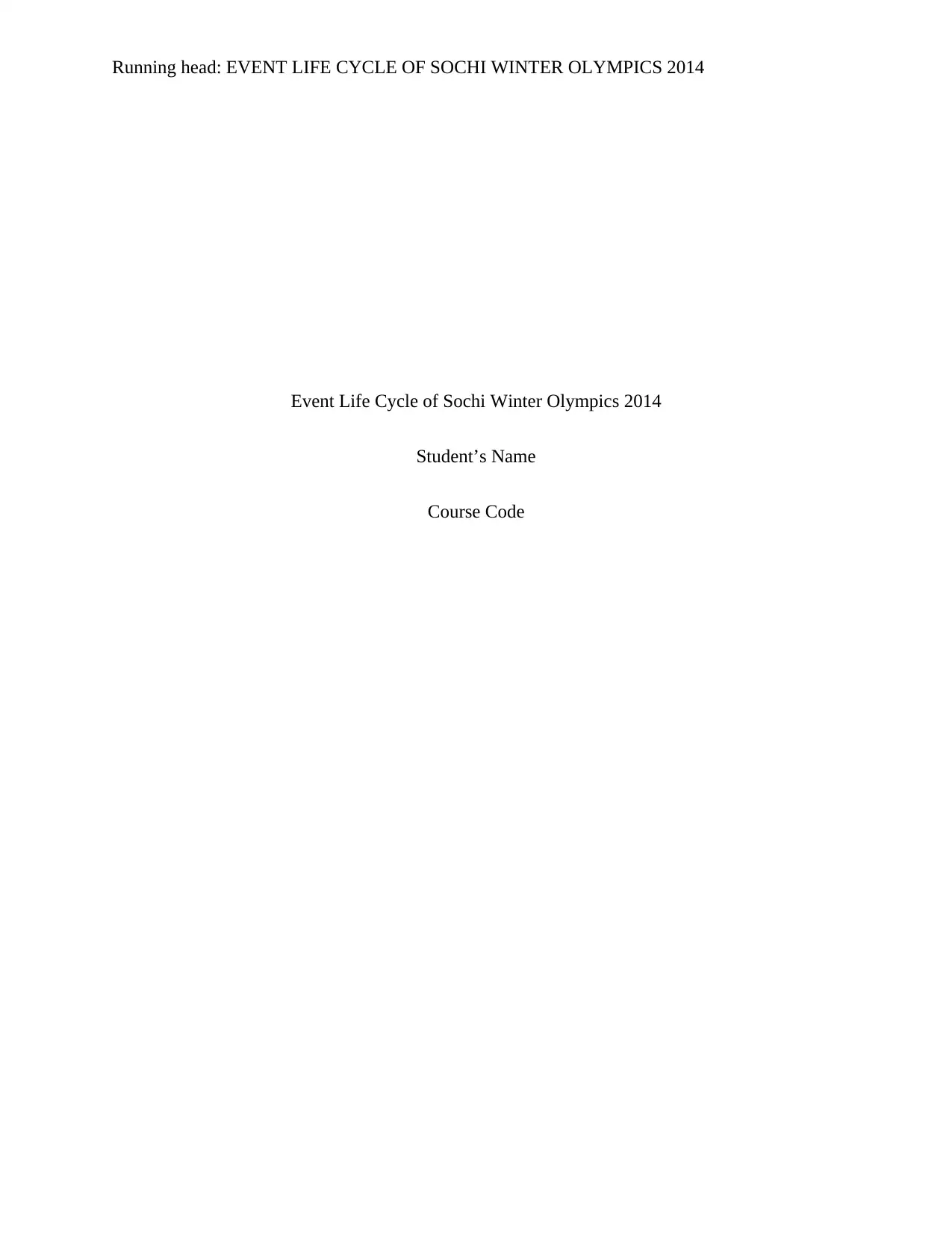
Running head: EVENT LIFE CYCLE OF SOCHI WINTER OLYMPICS 2014
Event Life Cycle of Sochi Winter Olympics 2014
Student’s Name
Course Code
Event Life Cycle of Sochi Winter Olympics 2014
Student’s Name
Course Code
Paraphrase This Document
Need a fresh take? Get an instant paraphrase of this document with our AI Paraphraser
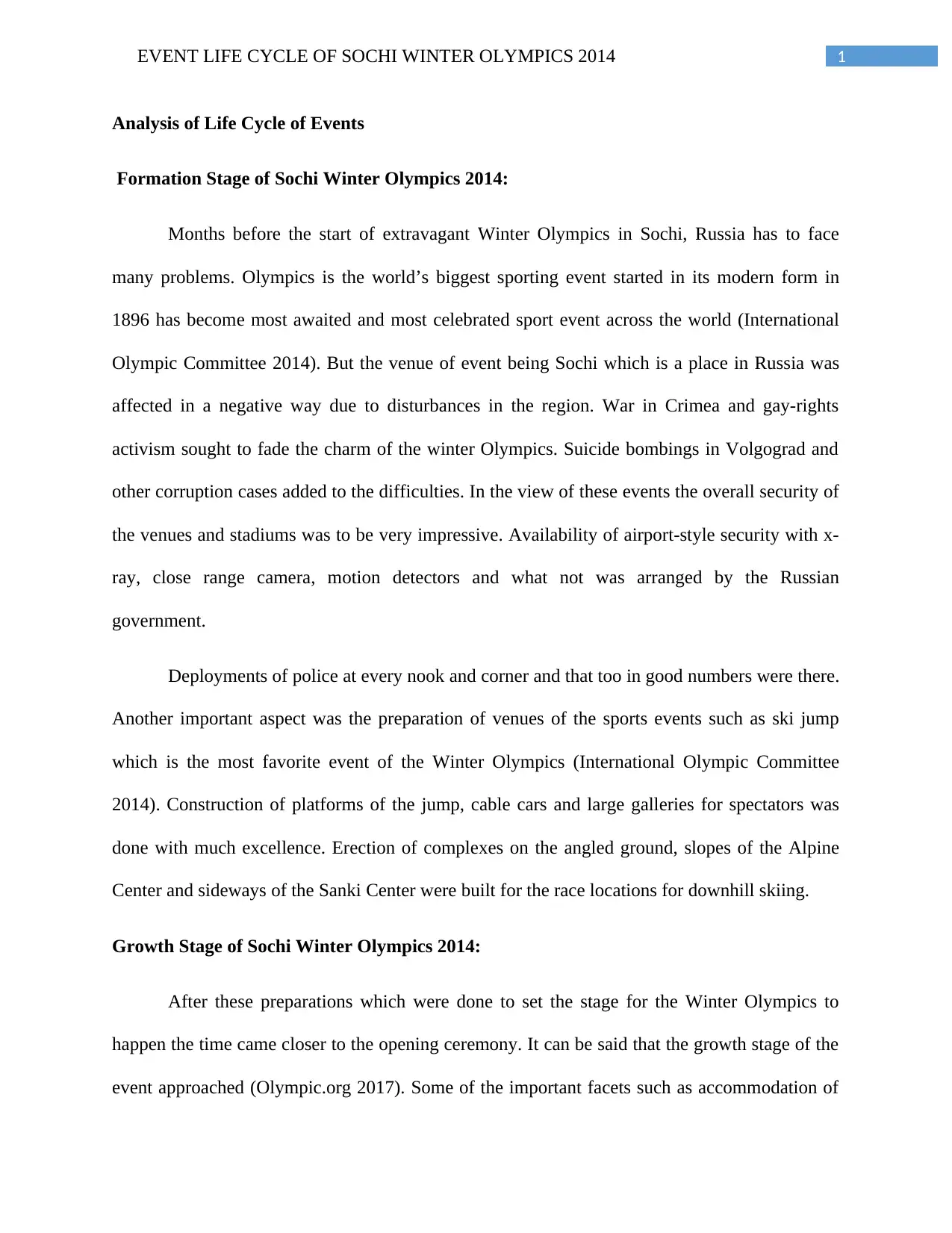
1EVENT LIFE CYCLE OF SOCHI WINTER OLYMPICS 2014
Analysis of Life Cycle of Events
Formation Stage of Sochi Winter Olympics 2014:
Months before the start of extravagant Winter Olympics in Sochi, Russia has to face
many problems. Olympics is the world’s biggest sporting event started in its modern form in
1896 has become most awaited and most celebrated sport event across the world (International
Olympic Committee 2014). But the venue of event being Sochi which is a place in Russia was
affected in a negative way due to disturbances in the region. War in Crimea and gay-rights
activism sought to fade the charm of the winter Olympics. Suicide bombings in Volgograd and
other corruption cases added to the difficulties. In the view of these events the overall security of
the venues and stadiums was to be very impressive. Availability of airport-style security with x-
ray, close range camera, motion detectors and what not was arranged by the Russian
government.
Deployments of police at every nook and corner and that too in good numbers were there.
Another important aspect was the preparation of venues of the sports events such as ski jump
which is the most favorite event of the Winter Olympics (International Olympic Committee
2014). Construction of platforms of the jump, cable cars and large galleries for spectators was
done with much excellence. Erection of complexes on the angled ground, slopes of the Alpine
Center and sideways of the Sanki Center were built for the race locations for downhill skiing.
Growth Stage of Sochi Winter Olympics 2014:
After these preparations which were done to set the stage for the Winter Olympics to
happen the time came closer to the opening ceremony. It can be said that the growth stage of the
event approached (Olympic.org 2017). Some of the important facets such as accommodation of
Analysis of Life Cycle of Events
Formation Stage of Sochi Winter Olympics 2014:
Months before the start of extravagant Winter Olympics in Sochi, Russia has to face
many problems. Olympics is the world’s biggest sporting event started in its modern form in
1896 has become most awaited and most celebrated sport event across the world (International
Olympic Committee 2014). But the venue of event being Sochi which is a place in Russia was
affected in a negative way due to disturbances in the region. War in Crimea and gay-rights
activism sought to fade the charm of the winter Olympics. Suicide bombings in Volgograd and
other corruption cases added to the difficulties. In the view of these events the overall security of
the venues and stadiums was to be very impressive. Availability of airport-style security with x-
ray, close range camera, motion detectors and what not was arranged by the Russian
government.
Deployments of police at every nook and corner and that too in good numbers were there.
Another important aspect was the preparation of venues of the sports events such as ski jump
which is the most favorite event of the Winter Olympics (International Olympic Committee
2014). Construction of platforms of the jump, cable cars and large galleries for spectators was
done with much excellence. Erection of complexes on the angled ground, slopes of the Alpine
Center and sideways of the Sanki Center were built for the race locations for downhill skiing.
Growth Stage of Sochi Winter Olympics 2014:
After these preparations which were done to set the stage for the Winter Olympics to
happen the time came closer to the opening ceremony. It can be said that the growth stage of the
event approached (Olympic.org 2017). Some of the important facets such as accommodation of
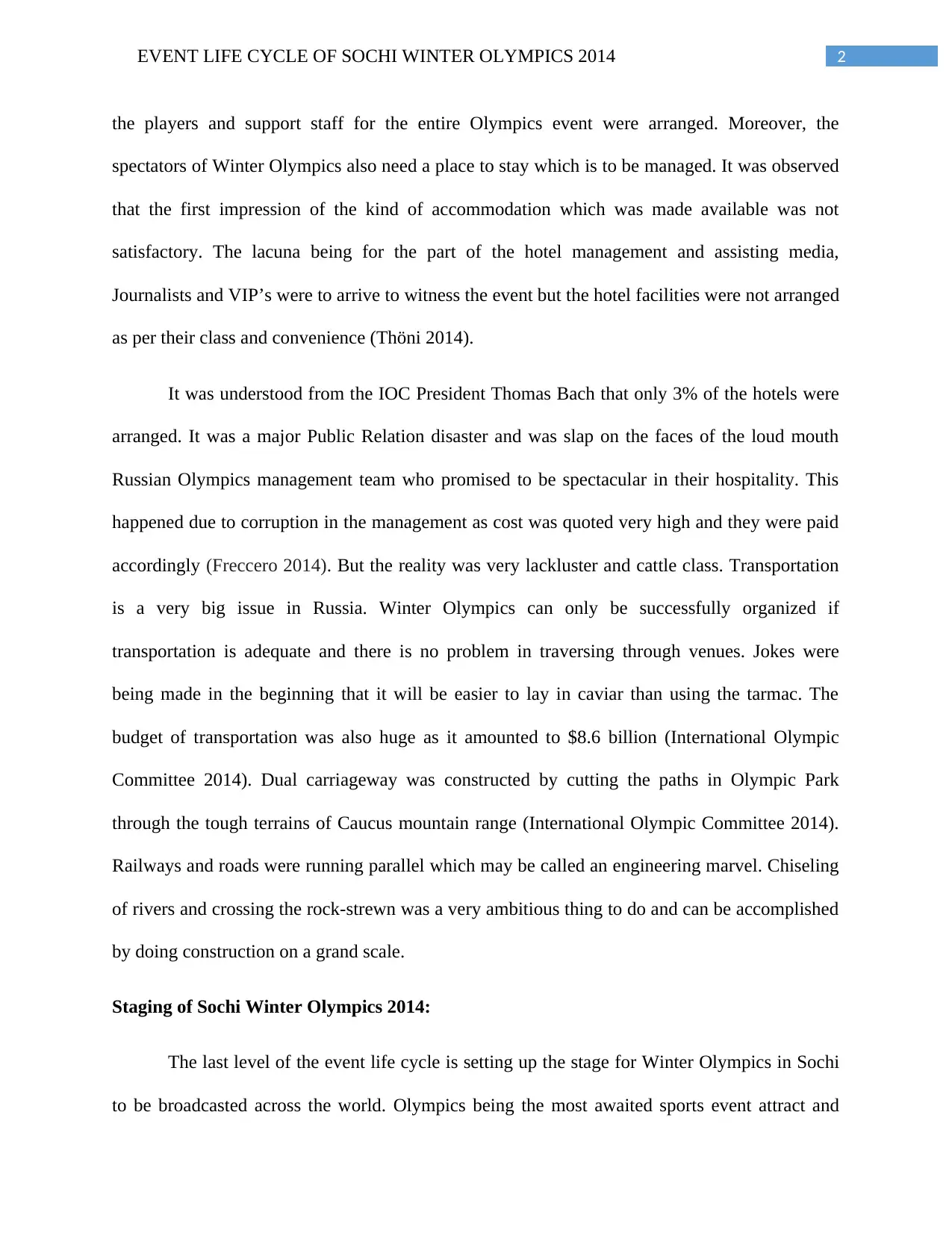
2EVENT LIFE CYCLE OF SOCHI WINTER OLYMPICS 2014
the players and support staff for the entire Olympics event were arranged. Moreover, the
spectators of Winter Olympics also need a place to stay which is to be managed. It was observed
that the first impression of the kind of accommodation which was made available was not
satisfactory. The lacuna being for the part of the hotel management and assisting media,
Journalists and VIP’s were to arrive to witness the event but the hotel facilities were not arranged
as per their class and convenience (Thöni 2014).
It was understood from the IOC President Thomas Bach that only 3% of the hotels were
arranged. It was a major Public Relation disaster and was slap on the faces of the loud mouth
Russian Olympics management team who promised to be spectacular in their hospitality. This
happened due to corruption in the management as cost was quoted very high and they were paid
accordingly (Freccero 2014). But the reality was very lackluster and cattle class. Transportation
is a very big issue in Russia. Winter Olympics can only be successfully organized if
transportation is adequate and there is no problem in traversing through venues. Jokes were
being made in the beginning that it will be easier to lay in caviar than using the tarmac. The
budget of transportation was also huge as it amounted to $8.6 billion (International Olympic
Committee 2014). Dual carriageway was constructed by cutting the paths in Olympic Park
through the tough terrains of Caucus mountain range (International Olympic Committee 2014).
Railways and roads were running parallel which may be called an engineering marvel. Chiseling
of rivers and crossing the rock-strewn was a very ambitious thing to do and can be accomplished
by doing construction on a grand scale.
Staging of Sochi Winter Olympics 2014:
The last level of the event life cycle is setting up the stage for Winter Olympics in Sochi
to be broadcasted across the world. Olympics being the most awaited sports event attract and
the players and support staff for the entire Olympics event were arranged. Moreover, the
spectators of Winter Olympics also need a place to stay which is to be managed. It was observed
that the first impression of the kind of accommodation which was made available was not
satisfactory. The lacuna being for the part of the hotel management and assisting media,
Journalists and VIP’s were to arrive to witness the event but the hotel facilities were not arranged
as per their class and convenience (Thöni 2014).
It was understood from the IOC President Thomas Bach that only 3% of the hotels were
arranged. It was a major Public Relation disaster and was slap on the faces of the loud mouth
Russian Olympics management team who promised to be spectacular in their hospitality. This
happened due to corruption in the management as cost was quoted very high and they were paid
accordingly (Freccero 2014). But the reality was very lackluster and cattle class. Transportation
is a very big issue in Russia. Winter Olympics can only be successfully organized if
transportation is adequate and there is no problem in traversing through venues. Jokes were
being made in the beginning that it will be easier to lay in caviar than using the tarmac. The
budget of transportation was also huge as it amounted to $8.6 billion (International Olympic
Committee 2014). Dual carriageway was constructed by cutting the paths in Olympic Park
through the tough terrains of Caucus mountain range (International Olympic Committee 2014).
Railways and roads were running parallel which may be called an engineering marvel. Chiseling
of rivers and crossing the rock-strewn was a very ambitious thing to do and can be accomplished
by doing construction on a grand scale.
Staging of Sochi Winter Olympics 2014:
The last level of the event life cycle is setting up the stage for Winter Olympics in Sochi
to be broadcasted across the world. Olympics being the most awaited sports event attract and
⊘ This is a preview!⊘
Do you want full access?
Subscribe today to unlock all pages.

Trusted by 1+ million students worldwide
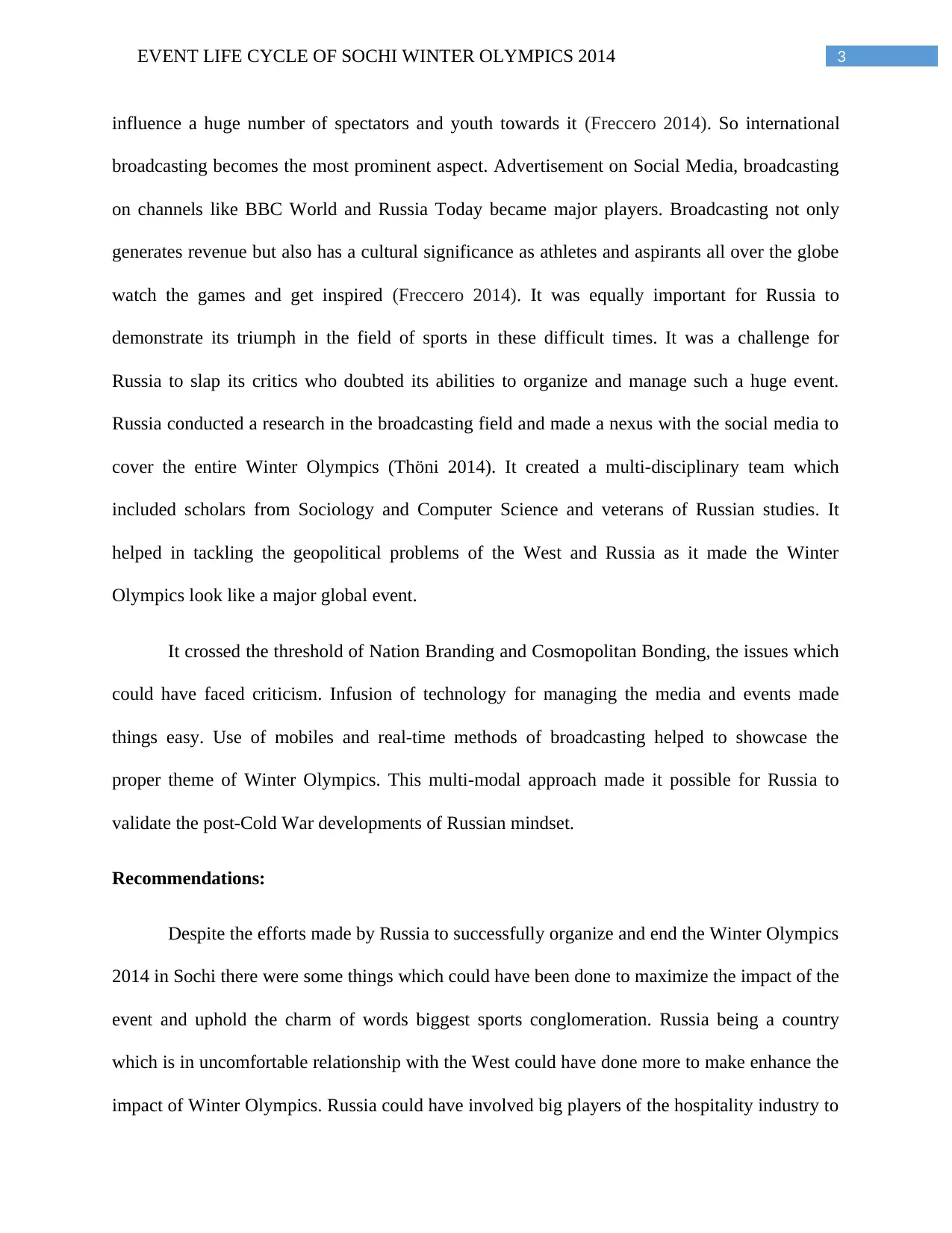
3EVENT LIFE CYCLE OF SOCHI WINTER OLYMPICS 2014
influence a huge number of spectators and youth towards it (Freccero 2014). So international
broadcasting becomes the most prominent aspect. Advertisement on Social Media, broadcasting
on channels like BBC World and Russia Today became major players. Broadcasting not only
generates revenue but also has a cultural significance as athletes and aspirants all over the globe
watch the games and get inspired (Freccero 2014). It was equally important for Russia to
demonstrate its triumph in the field of sports in these difficult times. It was a challenge for
Russia to slap its critics who doubted its abilities to organize and manage such a huge event.
Russia conducted a research in the broadcasting field and made a nexus with the social media to
cover the entire Winter Olympics (Thöni 2014). It created a multi-disciplinary team which
included scholars from Sociology and Computer Science and veterans of Russian studies. It
helped in tackling the geopolitical problems of the West and Russia as it made the Winter
Olympics look like a major global event.
It crossed the threshold of Nation Branding and Cosmopolitan Bonding, the issues which
could have faced criticism. Infusion of technology for managing the media and events made
things easy. Use of mobiles and real-time methods of broadcasting helped to showcase the
proper theme of Winter Olympics. This multi-modal approach made it possible for Russia to
validate the post-Cold War developments of Russian mindset.
Recommendations:
Despite the efforts made by Russia to successfully organize and end the Winter Olympics
2014 in Sochi there were some things which could have been done to maximize the impact of the
event and uphold the charm of words biggest sports conglomeration. Russia being a country
which is in uncomfortable relationship with the West could have done more to make enhance the
impact of Winter Olympics. Russia could have involved big players of the hospitality industry to
influence a huge number of spectators and youth towards it (Freccero 2014). So international
broadcasting becomes the most prominent aspect. Advertisement on Social Media, broadcasting
on channels like BBC World and Russia Today became major players. Broadcasting not only
generates revenue but also has a cultural significance as athletes and aspirants all over the globe
watch the games and get inspired (Freccero 2014). It was equally important for Russia to
demonstrate its triumph in the field of sports in these difficult times. It was a challenge for
Russia to slap its critics who doubted its abilities to organize and manage such a huge event.
Russia conducted a research in the broadcasting field and made a nexus with the social media to
cover the entire Winter Olympics (Thöni 2014). It created a multi-disciplinary team which
included scholars from Sociology and Computer Science and veterans of Russian studies. It
helped in tackling the geopolitical problems of the West and Russia as it made the Winter
Olympics look like a major global event.
It crossed the threshold of Nation Branding and Cosmopolitan Bonding, the issues which
could have faced criticism. Infusion of technology for managing the media and events made
things easy. Use of mobiles and real-time methods of broadcasting helped to showcase the
proper theme of Winter Olympics. This multi-modal approach made it possible for Russia to
validate the post-Cold War developments of Russian mindset.
Recommendations:
Despite the efforts made by Russia to successfully organize and end the Winter Olympics
2014 in Sochi there were some things which could have been done to maximize the impact of the
event and uphold the charm of words biggest sports conglomeration. Russia being a country
which is in uncomfortable relationship with the West could have done more to make enhance the
impact of Winter Olympics. Russia could have involved big players of the hospitality industry to
Paraphrase This Document
Need a fresh take? Get an instant paraphrase of this document with our AI Paraphraser
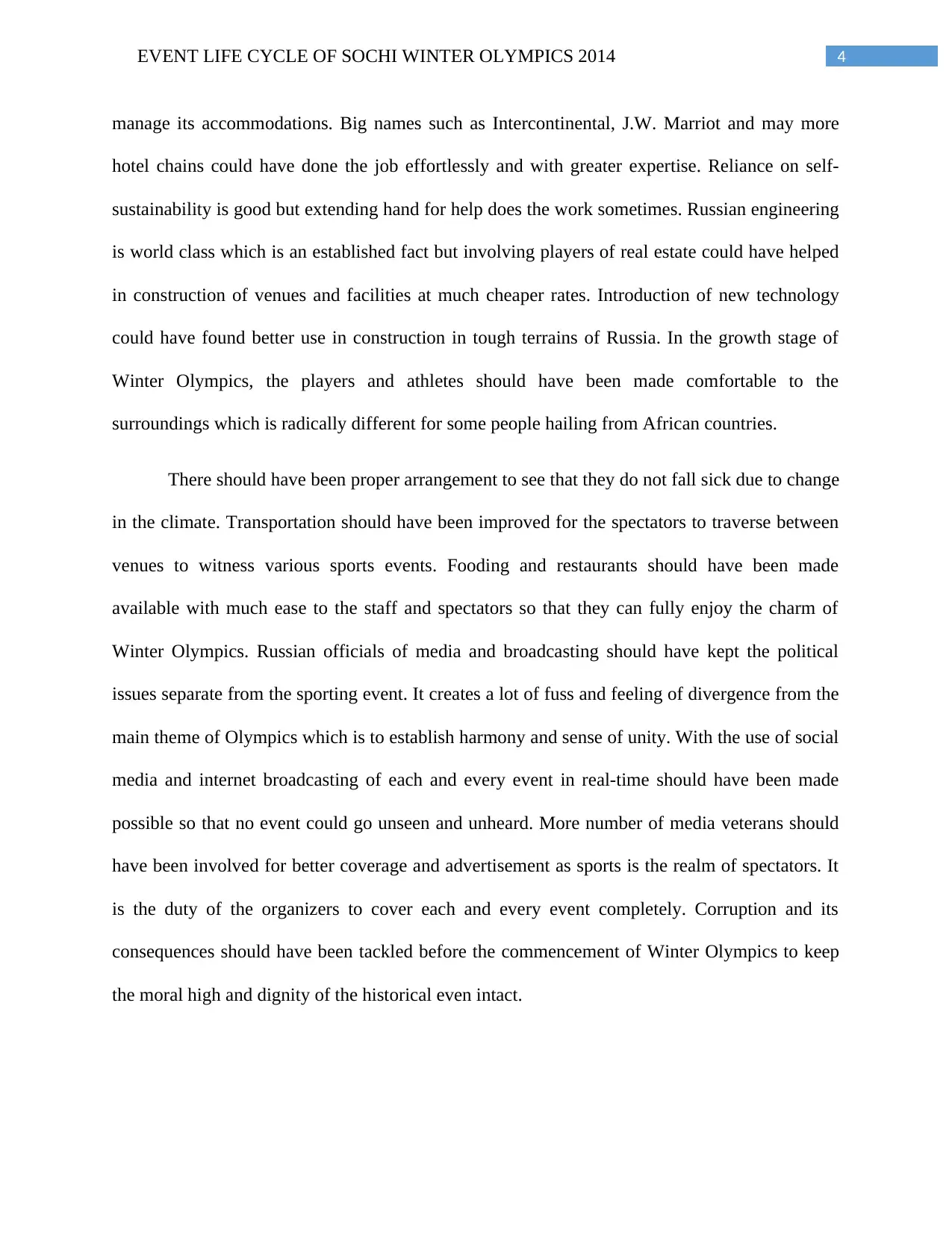
4EVENT LIFE CYCLE OF SOCHI WINTER OLYMPICS 2014
manage its accommodations. Big names such as Intercontinental, J.W. Marriot and may more
hotel chains could have done the job effortlessly and with greater expertise. Reliance on self-
sustainability is good but extending hand for help does the work sometimes. Russian engineering
is world class which is an established fact but involving players of real estate could have helped
in construction of venues and facilities at much cheaper rates. Introduction of new technology
could have found better use in construction in tough terrains of Russia. In the growth stage of
Winter Olympics, the players and athletes should have been made comfortable to the
surroundings which is radically different for some people hailing from African countries.
There should have been proper arrangement to see that they do not fall sick due to change
in the climate. Transportation should have been improved for the spectators to traverse between
venues to witness various sports events. Fooding and restaurants should have been made
available with much ease to the staff and spectators so that they can fully enjoy the charm of
Winter Olympics. Russian officials of media and broadcasting should have kept the political
issues separate from the sporting event. It creates a lot of fuss and feeling of divergence from the
main theme of Olympics which is to establish harmony and sense of unity. With the use of social
media and internet broadcasting of each and every event in real-time should have been made
possible so that no event could go unseen and unheard. More number of media veterans should
have been involved for better coverage and advertisement as sports is the realm of spectators. It
is the duty of the organizers to cover each and every event completely. Corruption and its
consequences should have been tackled before the commencement of Winter Olympics to keep
the moral high and dignity of the historical even intact.
manage its accommodations. Big names such as Intercontinental, J.W. Marriot and may more
hotel chains could have done the job effortlessly and with greater expertise. Reliance on self-
sustainability is good but extending hand for help does the work sometimes. Russian engineering
is world class which is an established fact but involving players of real estate could have helped
in construction of venues and facilities at much cheaper rates. Introduction of new technology
could have found better use in construction in tough terrains of Russia. In the growth stage of
Winter Olympics, the players and athletes should have been made comfortable to the
surroundings which is radically different for some people hailing from African countries.
There should have been proper arrangement to see that they do not fall sick due to change
in the climate. Transportation should have been improved for the spectators to traverse between
venues to witness various sports events. Fooding and restaurants should have been made
available with much ease to the staff and spectators so that they can fully enjoy the charm of
Winter Olympics. Russian officials of media and broadcasting should have kept the political
issues separate from the sporting event. It creates a lot of fuss and feeling of divergence from the
main theme of Olympics which is to establish harmony and sense of unity. With the use of social
media and internet broadcasting of each and every event in real-time should have been made
possible so that no event could go unseen and unheard. More number of media veterans should
have been involved for better coverage and advertisement as sports is the realm of spectators. It
is the duty of the organizers to cover each and every event completely. Corruption and its
consequences should have been tackled before the commencement of Winter Olympics to keep
the moral high and dignity of the historical even intact.
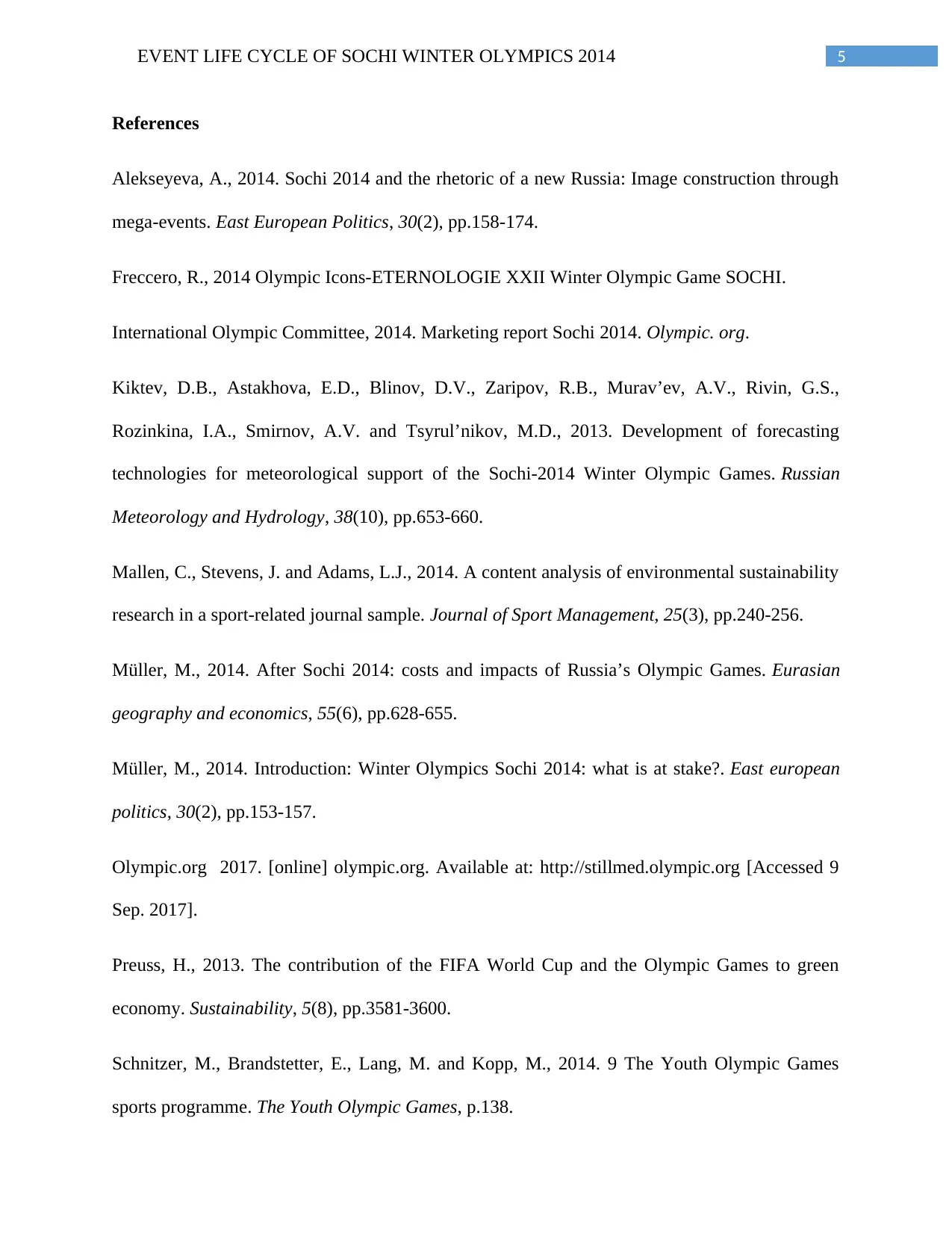
5EVENT LIFE CYCLE OF SOCHI WINTER OLYMPICS 2014
References
Alekseyeva, A., 2014. Sochi 2014 and the rhetoric of a new Russia: Image construction through
mega-events. East European Politics, 30(2), pp.158-174.
Freccero, R., 2014 Olympic Icons-ETERNOLOGIE XXII Winter Olympic Game SOCHI.
International Olympic Committee, 2014. Marketing report Sochi 2014. Olympic. org.
Kiktev, D.B., Astakhova, E.D., Blinov, D.V., Zaripov, R.B., Murav’ev, A.V., Rivin, G.S.,
Rozinkina, I.A., Smirnov, A.V. and Tsyrul’nikov, M.D., 2013. Development of forecasting
technologies for meteorological support of the Sochi-2014 Winter Olympic Games. Russian
Meteorology and Hydrology, 38(10), pp.653-660.
Mallen, C., Stevens, J. and Adams, L.J., 2014. A content analysis of environmental sustainability
research in a sport-related journal sample. Journal of Sport Management, 25(3), pp.240-256.
Müller, M., 2014. After Sochi 2014: costs and impacts of Russia’s Olympic Games. Eurasian
geography and economics, 55(6), pp.628-655.
Müller, M., 2014. Introduction: Winter Olympics Sochi 2014: what is at stake?. East european
politics, 30(2), pp.153-157.
Olympic.org 2017. [online] olympic.org. Available at: http://stillmed.olympic.org [Accessed 9
Sep. 2017].
Preuss, H., 2013. The contribution of the FIFA World Cup and the Olympic Games to green
economy. Sustainability, 5(8), pp.3581-3600.
Schnitzer, M., Brandstetter, E., Lang, M. and Kopp, M., 2014. 9 The Youth Olympic Games
sports programme. The Youth Olympic Games, p.138.
References
Alekseyeva, A., 2014. Sochi 2014 and the rhetoric of a new Russia: Image construction through
mega-events. East European Politics, 30(2), pp.158-174.
Freccero, R., 2014 Olympic Icons-ETERNOLOGIE XXII Winter Olympic Game SOCHI.
International Olympic Committee, 2014. Marketing report Sochi 2014. Olympic. org.
Kiktev, D.B., Astakhova, E.D., Blinov, D.V., Zaripov, R.B., Murav’ev, A.V., Rivin, G.S.,
Rozinkina, I.A., Smirnov, A.V. and Tsyrul’nikov, M.D., 2013. Development of forecasting
technologies for meteorological support of the Sochi-2014 Winter Olympic Games. Russian
Meteorology and Hydrology, 38(10), pp.653-660.
Mallen, C., Stevens, J. and Adams, L.J., 2014. A content analysis of environmental sustainability
research in a sport-related journal sample. Journal of Sport Management, 25(3), pp.240-256.
Müller, M., 2014. After Sochi 2014: costs and impacts of Russia’s Olympic Games. Eurasian
geography and economics, 55(6), pp.628-655.
Müller, M., 2014. Introduction: Winter Olympics Sochi 2014: what is at stake?. East european
politics, 30(2), pp.153-157.
Olympic.org 2017. [online] olympic.org. Available at: http://stillmed.olympic.org [Accessed 9
Sep. 2017].
Preuss, H., 2013. The contribution of the FIFA World Cup and the Olympic Games to green
economy. Sustainability, 5(8), pp.3581-3600.
Schnitzer, M., Brandstetter, E., Lang, M. and Kopp, M., 2014. 9 The Youth Olympic Games
sports programme. The Youth Olympic Games, p.138.
⊘ This is a preview!⊘
Do you want full access?
Subscribe today to unlock all pages.

Trusted by 1+ million students worldwide
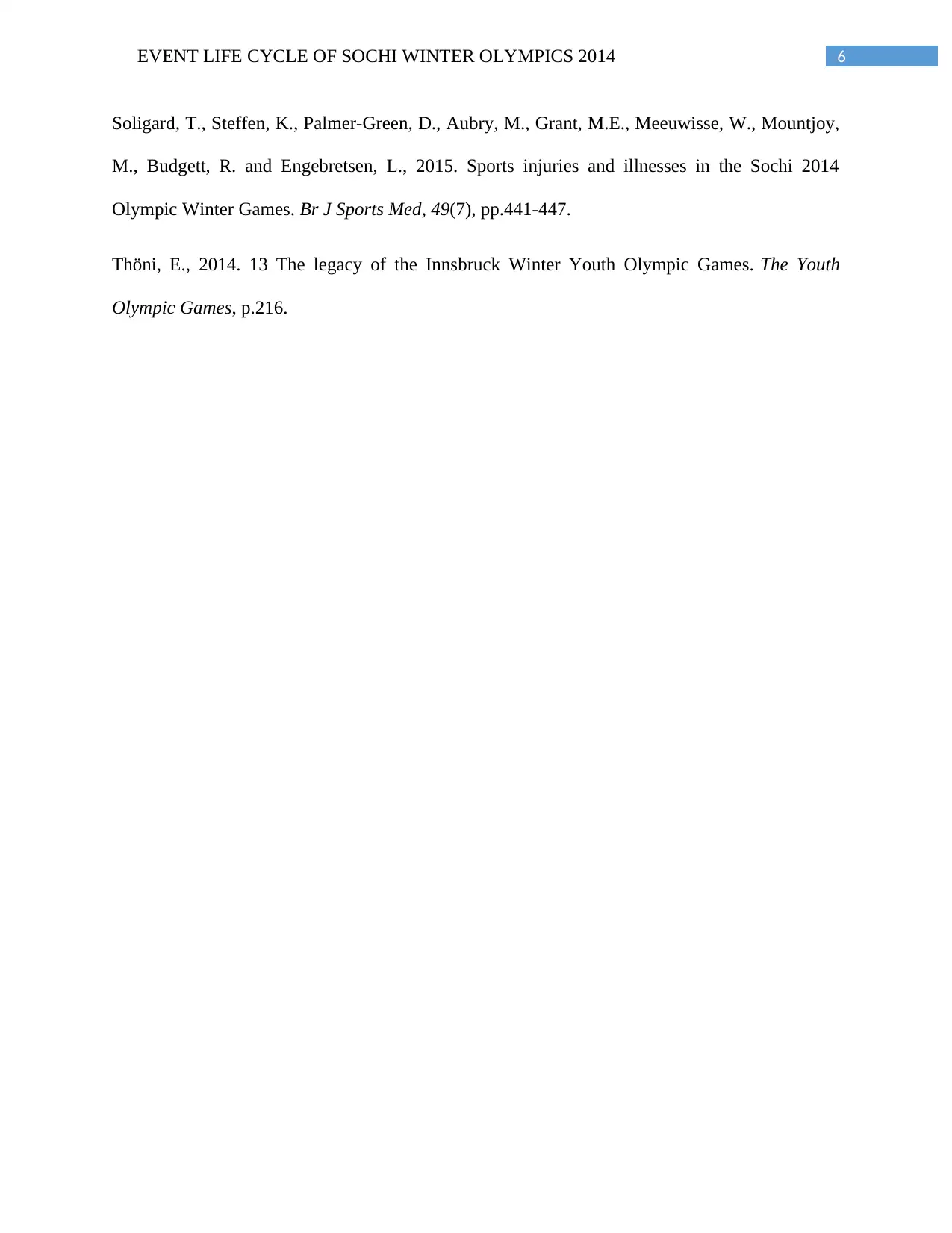
6EVENT LIFE CYCLE OF SOCHI WINTER OLYMPICS 2014
Soligard, T., Steffen, K., Palmer-Green, D., Aubry, M., Grant, M.E., Meeuwisse, W., Mountjoy,
M., Budgett, R. and Engebretsen, L., 2015. Sports injuries and illnesses in the Sochi 2014
Olympic Winter Games. Br J Sports Med, 49(7), pp.441-447.
Thöni, E., 2014. 13 The legacy of the Innsbruck Winter Youth Olympic Games. The Youth
Olympic Games, p.216.
Soligard, T., Steffen, K., Palmer-Green, D., Aubry, M., Grant, M.E., Meeuwisse, W., Mountjoy,
M., Budgett, R. and Engebretsen, L., 2015. Sports injuries and illnesses in the Sochi 2014
Olympic Winter Games. Br J Sports Med, 49(7), pp.441-447.
Thöni, E., 2014. 13 The legacy of the Innsbruck Winter Youth Olympic Games. The Youth
Olympic Games, p.216.
1 out of 7
Related Documents
Your All-in-One AI-Powered Toolkit for Academic Success.
+13062052269
info@desklib.com
Available 24*7 on WhatsApp / Email
![[object Object]](/_next/static/media/star-bottom.7253800d.svg)
Unlock your academic potential
Copyright © 2020–2026 A2Z Services. All Rights Reserved. Developed and managed by ZUCOL.




